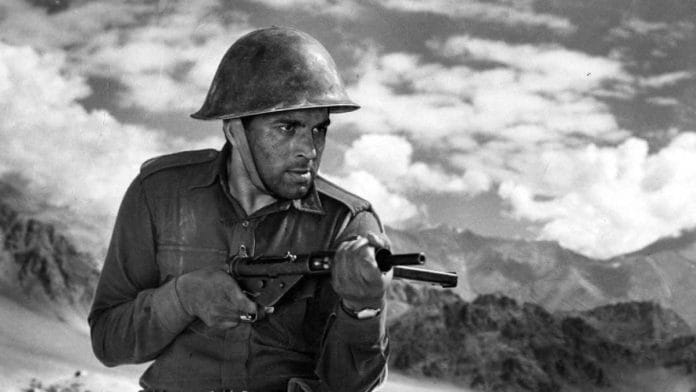Two years after the 1962 Indo-China war, when the wounds were still fresh, director and producer Chetan Anand did what few could have ever imagined. He made Haqeeqat, one of Indian cinema’s more realistic war movies.
The 1964 film offers a grim look at the lives of soldiers fighting in tough conditions. Chetan Anand calls out the government’s lack of military preparedness without pulling any punches, ensuring that his film pulsates with patriotism.
Haqeeqat takes viewers to Ladakh, where an Indian Army platoon led by
Major Ranjeet Singh (Balraj Sahni) tries to fend off the invading Chinese Army in a harsh and unforgiving landscape. There are multiple sub-plots, such as Captain Bahadur Singh (Dharmendra)’s romance with a Ladakhi woman named Angmo (Priya Rajvansh).
But what stands out is the emotional and psychological turmoil of the soldiers who were outnumbered by Chinese invaders. It’s melodramatic but Anand doesn’t try to mask the situation with machismo or bravado.
A soldier lying on the snow calls out to his mother: “I want to go to my mother; I can’t endure this cold anymore.”
Haqeeqat won the National Film Award for Second Best Feature Film in 1965. It was released in colour in 2012.
Grit meets sentiment
Indian soldiers’ death march in a blizzard is a chilling visual in Haqeeqat.
In this scene, Major Ranjeet Singh leads a group of soldiers stranded in a freezing terrain. The soldiers determinedly follow in his lead – trudging across heaps of snow despite exhaustion and dwindling supplies.
At one point, a young Army officer asks: “Major, how much farther do we need to go? To this, Singh, while masking his own exhaustion, replies: “As far as we can from death”.
Scenes like this contrast the vulnerability of the soldiers with their unwavering patriotism. The war is personal. Their sacrifice all the more so.
Jal Mistry’s cinematography enhances the sense of desolation in this scene, while Kaifi Azmi’s dialogues capture conflicting sentiments of hope and despair. Main Yeh Soch Kar Uske Dar Se Utha Tha, sung by Mohammed Rafi, plays in the background – a subtle, mournful melody that amplifies the soldiers’ helplessness.
Chetan Anand avoids glorifying war. Haqeeqat presents a nuanced tale of courage, sacrifice, and tragic inevitability. Indian soldiers’ bravery shines in scenes where they refuse to abandon their posts. A supporting cast comprising actors Sanjay Khan and Vijay drives home this point.
Adding emotional depth is Angmo (Priya Rajvansh), a young Ladakhi woman whose love for her homeland drives her to help Indian soldiers. Her relationship with Dharmendra’s character lends a tender dimension to an otherwise grim narrative.
Rajvansh, in her debut role, lends grace to her character. Her scenes with Balraj Sahni and Dharmendra stand out for their emotional intensity.
But it’s the group of unknown soldiers—comprising real Army personnel—that truly make the film memorable. Their camaraderie, sacrifice, and raw humanity make their deaths even more heartbreaking.
Also read:
Love letter to Ladakh
VK Murthy’s cinematography manages to bring the magic of Ladakh to Hindi viewers—in black and white. Notably, Haqeeqat was the first Bollywood film to be shot in Ladakh.
The film highlights the region’s culture and heritage through villagers who often come to the aid of Indian soldiers. It immortalised Ladakh in Indian cinema, making it a character in its own right—an unyielding hero who is witness to love, loss, and valour.
But there’s a heavy dose of this. Empty shots of snow-covered mountain terrains, rugged valleys, and the endless skies are used as fillers throughout the movie.
Haqeeqat’s musical brilliance
Haqeeqat’s music is one of its crowning glories.
Scored by Madan Mohan, with lyrics by Kaifi Azmi, the soundtrack beautifully complements the film’s emotional and patriotic core.
Ab Tumhare Hawale Watan Sathiyon, sung by Mohammed Rafi, has become an anthem of sacrifice. It lingers in your head, even after the film ends.
Even today, the haunting melody reverberates through schools during Independence and Republic Day celebrations, evoking a deep sense of pride and loss.
Hoke Majboor Mujhe Usne Bulaya Hoga, sung by Mohammed Rafi, Talat Mahmood, Bhupinder Singh, and Manna Dey, sparked similar emotions.
The music’s brilliance lies in its ability to elevate the film’s emotional weight.
The songs don’t just describe the events – they draw the audience in, playing on patriotism, courage and the futility of war.
Views are personal.
(Edited by Zoya Bhatti)







Hello,
I think without you reviewing such films I would not have come across these gems.
I watched it this weekend and as you said it’s poignant depiction of war is very moving.
Thanks